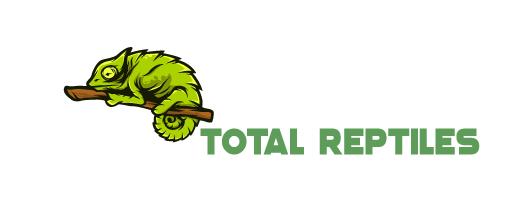Pogona vitticeps are quite fascinating creatures with docile personalities. This trait seems to amplify further when their body signal for brumation.
The new owners may then wonder one thing about the lizard – do bearded dragons poop during brumation?
Well, it is a crucial point to note that brumation is similar to hibernation except for the uninterrupted dormant or sleep state. It means bearded dragons wake up briefly to sustain themselves, which leads to very infrequent pooping.
There is more to it than meets the eye. So, take your time going over this article to find out the important information in detail.
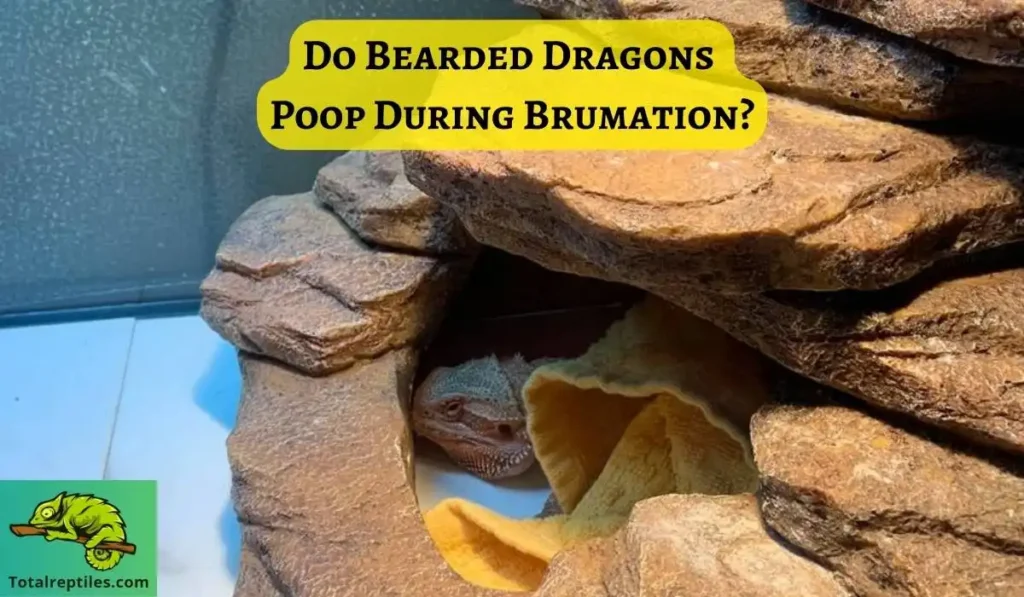
Digestion in Bearded Dragons
It is not that complicated to understand once you see how the anatomy of the digestive system works in a beardie.
The Digestive System of Bearded Dragons and How It Works
In research, the radiographic image showed that the reptilian gastrointestinal (GI) tract is composed of an esophagus, a stomach, a duodenal bulb, a short small intestine, a cecum, and a colon.
Here is how it works in the order during active seasons:

Generally, it takes about 24 hours to several days for the dragon to digest food, depending on the provided meal plan. The fresher the food, the better the system will be.
However, from a daily bathroom break to an infrequent one (once or twice a week), both are considered normal. Being consistent with a balanced diet ensures smooth digestion overall.
On the other hand, an older bearded dragon will have signs of slower metabolism, resulting in sluggish digestion.
Bearded Dragons and Humans Digestive System
Despite being amphibian, bearded dragons are vertebrate species just as humans are. Therefore, some bodily functions are similar. The digestive system is one significant example.
However, it is not as plain as it sounds. Although both are monogastric (consisting of a single stomach), certain sections are different. Perhaps this comparison chart may aid you better:
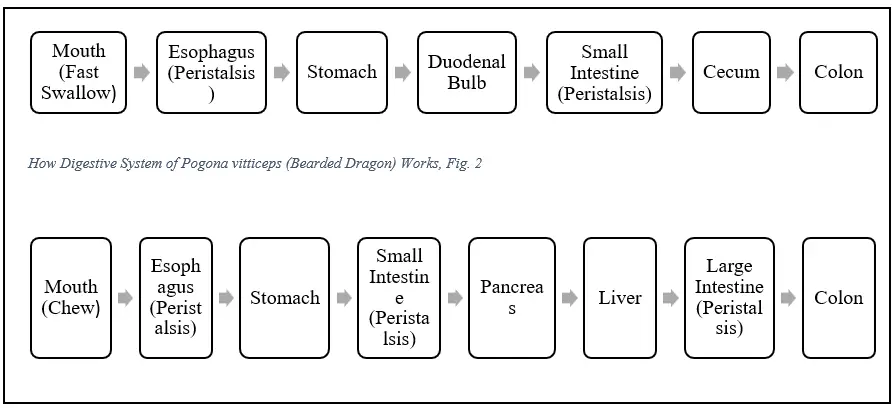
Also, remember that bearded dragon intestines are relatively smaller in length than human intestines. This is the major variation between the two species.
Effects of Brumation on the Digestive System of Bearded Dragons
When the brumation period hits the biological clock of a bearded dragon, it grows inactive, loses its appetite, and metabolic rates slow down. Thus, your lizard will eat less and less until it enters brumation in full.
Plus, dragons are ectotherms. They are incapable of regulating their own body heat. Since basking under intense light and temperature plays a vital role in healthy digestion, it is impossible to achieve this during brumation.
It is because the vivarium environment drops in temperature, hinting at the winter/cold season.
So, the digestive system of the bearded dragon shuts down in response alongside a substantial drop in heart rate. Your dragon will appear to be in a deep sleep with little to no bowel movement in the subsequence.
Bearded Dragons and Pooping During Brumation
It is a mere yes or no situation when it comes to Pogona vitticeps and their pooping function in a brumation state. The section below will clear up your confusion.
Relationship Between Brumation and Bowel Movements in Bearded Dragons
Each bearded dragon has a unique habit or trait to separate it from the rest. In that sense, whether yours will poop or no relies on its behavioral pattern.
It depends on the environment as well. If the enclosure is warm enough to reduce the brumation period, your beardie may come out of a reclusive and sluggish period to return to the regular feeding parameters sooner.
You must adjust the temperature and lighting timely to naturally induce and dissuade brumation that matches the Central Australian environment.
Why Do Bearded Dragons Not Poop During Brumation?
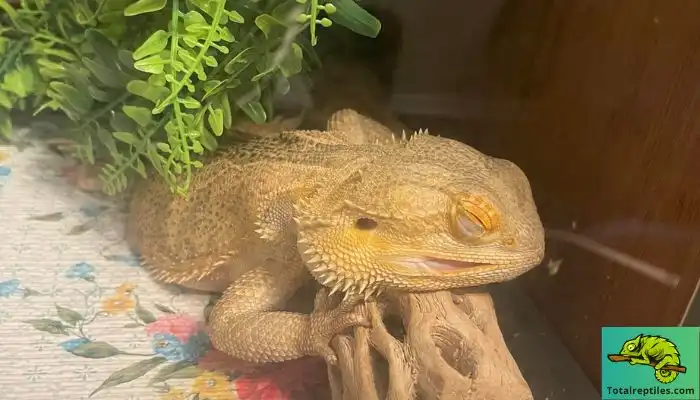
A beginner reptile owner often asks why such low or no bowel movement during brumation.
Before we get to the point, understand what impaction is in a beardie. It is when the digestive tract has been blocked by undigested hard mass or food pieces.
This is a very serious issue that can also be potentially fatal, even if your pet is healthy.
Now, the brumation period refers to burrowing or hiding in a safe den to overcome the adverse effects and food scarcity of winter months while conserving energy. Cold weather means no chance of proper basking.
And basking is highly essential for smooth digestion to attain healthy bowel movement. Since there is no basking possibility, bearded dragons will naturally not eat or poop.
You must ensure that the colon is clear of feces before entering brumation to prevent fecal impaction.
How Long Can a Bearded Dragon Go Without Pooping During Brumation?
It is absolutely normal for a bearded dragon to go weeks without pooping at all. Of course, you must consult a vet if an active dragon goes this long, which is a sign of an illness.
A brumation period can last over two weeks but less than five weeks. During this occasion, your lizard may wake up once or twice to drink water only.
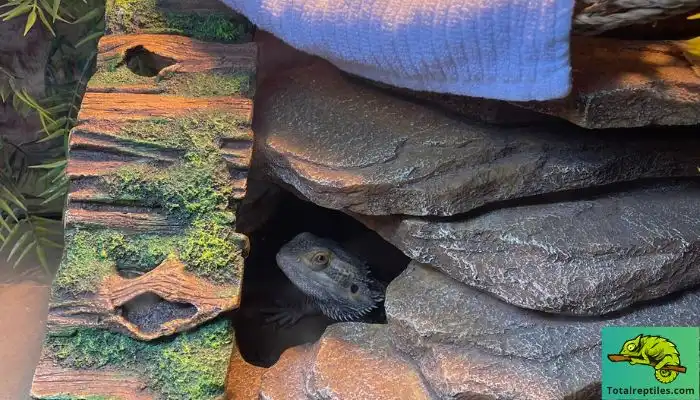
It will not eat solid food, so do not offer any. This is why you will notice minimal substrate cleaning hassle, as the beardie most certainly does not poop frequently.
Do Bearded Dragons Poop a Lot Before Brumation?
You should stay alert and ready to provide fresh water, food, and substrate before the dormancy state hits because beardies poop a lot before brumation.
This is also a typical pattern that takes place in order to prepare their body for the hibernation-like state. During this moment, your reptile will have a bigger appetite to store additional energy in its body.
As an outcome, it will poop more frequently than usual before showing lethargic signs.
How Often Should a Bearded Dragon Poop During Brumation?
You will notice a pooping pattern shift as the brumation period looms ahead. So, you must monitor the pet’s health to ascertain it is receiving proper nutrition and suffers from no impaction.
Expect more than a couple of weeks of delay of pooping during brumation due to slowed down digestive system. However, it can vary due to the activity level and diet it is used to.
Juvenile dragons may have slower bowel movements than adults often. Once again, their current health plays an essential role in determining the routine.
Conclusion
So, do bearded dragons poop during brumation? The answer is pretty simple, though with a tricky elaboration.
Yet, the short answer is that your pet beardie will not eat during this process. Hence, there is little to zero chance of defecating in the process.
Nevertheless, if you notice the reptile is coming out of its dormancy, place fresh meals in small amounts for sustenance. Drinking water must be included at all times, brumation or not.
Lastly, do not bother the dragon when it is brumating and not pooping. It is part of their physical behavior.
